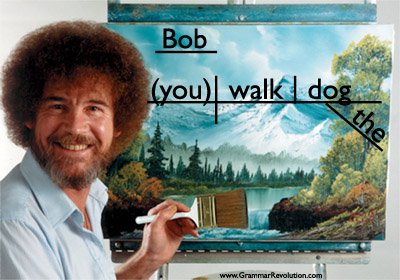Do imperative sentences (commands) ever have stated subjects?
Do imperative sentences (commands)
ever have stated subjects?
- Home
- Sentence Types
- Commands With Stated Subject?
How well do you know imperative sentences? In this lesson, we're going over something that can be kind of confusing about them. Are you ready? Great!
Here's the sentence we'll be studying:
Bob, walk the dog.
Before we look at how categorizing this sentence can be confusing, let's review what imperative sentences are.
Imperative Sentence Refresher
Imperative sentences give commands.
- Walk the dog.
- Open the door.
- Please wipe your feet.
Notice that imperative sentences don't state the subject of the sentence. (Remember that subjects tell us whom or what a sentence is about.) While these guys don't state the subject, they do have a subject. Their subject is the implied word you, which we call you understood.
- (you) Walk the dog.
- (you) Open the door.
- (you) Please wipe your feet.
If you think about it, this makes sense because when you're giving a command, you're speaking to someone. That someone is the subject, and we name them with the pronoun you.
Commands With Stated Subjects?
Now, let's get to the tricky part. What happens when we take a command and add the name of the person we are addressing?
- Bob, walk the dog.
- Tess, open the door.
- Oden, please wipe your feet.
Are these sentences still commands, or are they now statements because they seem to have a named subject?

To answer this question, we need to learn about one more grammatical concept called nouns of direct address.
Nouns of Direct Address
Nouns of direct address are nouns that address the person or thing you are speaking to. They are not subjects of sentences.
- Bob, walk the dog.
- Tess, open the door.
- Oden, please wipe your feet.
Remember that the subject of all imperative sentences is (you). This remains true even when we begin an imperative sentence with a noun of direct address.
- Bob, (you) walk the dog.
- Tess, (you) open the door.
- Oden, (you) please wipe your feet.
It is a coincidence that in these cases the noun of direct address and the subject (you) are referring to the same person. However, that doesn't mean that you can use them interchangeably as subjects.
The bottom line is that commands do not have stated subjects.
Their subjects are always understood you. When you begin a command naming the person you are addressing, that noun is called a noun of direct address. It is a noun, but it is not the subject.
Does that seem strange?
Does it still seem like nouns of direct address should be subjects when used with commands? If so, here are two helpful things to consider.
Helpful Thing #1: The reason that commands are commands has to do with the verb in the sentence. These verbs are written with in what is called the imperative mood. This "mood" doesn't change based on other words around it.
Imperative verbs are formed differently in different languages. In English, we use the present tense, second-person, bare infinitive form of the verb to create imperative verbs.
Helpful Thing #2: Check out these declarative sentences that begin with nouns of direct address. I have underlined the subjects for you.
Tom, the fall is a beautiful time of year.
Jerry, water freezes at 32 degrees Fahrenheit.
Yikes! If we treated nouns of direct address as subjects, we wouldn't know if the subjects were Tom and Jerry or fall and water.
Luckily, we don't have to worry about this because nouns of direct address are never subjects. Whew!

P.S. If you're wondering how to diagram that sentence, here's Bob Ross showing us how it's done.
Thanks for your help, Bob! I knew you were a painter, but I didn't know you also diagrammed sentences.
If you'd like to teach or learn grammar the easy way—with sentence diagrams—check out our Get Smart Grammar Program.
It starts from the very beginning and teaches you grammar and sentence diagramming in easy, bite-size lessons.

Hello! I'm Elizabeth O'Brien, and my goal is to get you jazzed about grammar.
Like many, I adore your program. I have a BA in English, an MA in Psychology, and am a certified TEFL instructor. Yet NONE of those marvelous programs taught me grammar!
Thank you, Elizabeth. THANK YOU, THANK YOU, THANK YOU. (You're a rock star!)
My students, by the way, also adore your program!
- Michelle, Adult ESL Teacher
This is original content from https://www.english-grammar-revolution.com/imperative-sentences.html
Our Free Guide Gives You A Fun Way
To Teach And Learn The Basics v

Elizabeth O'Brien is the creator of Grammar Revolution.
Her lessons are guaranteed to give you more confidence in your communication skills and make you smile. :)

